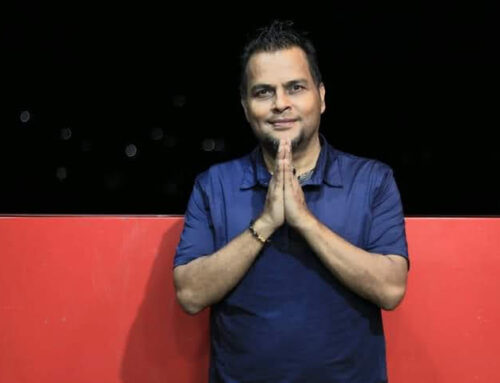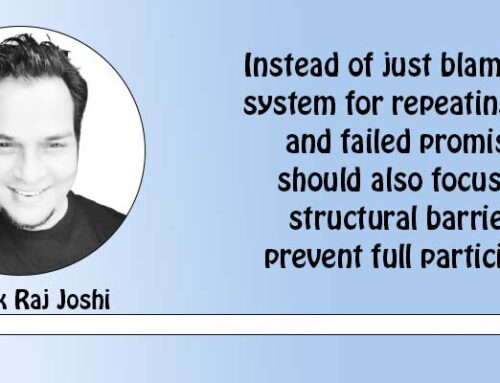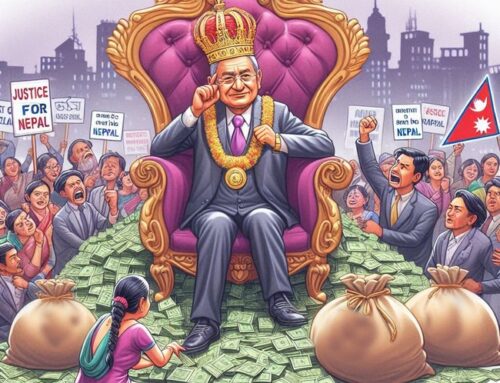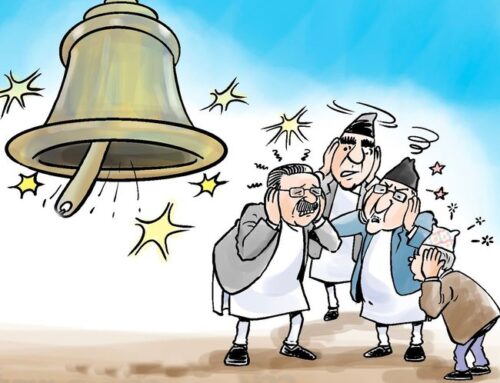“There Is Frequent Political Intervention In Schools And Universities In Nepal” Dr. JEET JOSHEE
Dr. JEET JOSHEE is the first Nepali-American to hold the prestigious position at California State University, Long Beach USA. Joshee, who was born in Bandipur, Tanahu in western Nepal, attended Bhanu High School , Bandipur, Tanahun. He left Nepal in pursuit of higher education to the United States some 33 plus years ago. He got his first master Degree from School for International Training in Vermont, USA and second Master degree and Doctoral Degree in International Development Education form University of Massachusetts at Amherst. He was an Assistant Dean at University of Connecticut and was appointed Dean in 2005 at Cal State San Bernardino. Now is he is Associate Vice President for International Education and Global Engagement and Dean of the College of Professional and International Education at California State University, Long Beach. He is also a the President of the American International Recruitment Council (AIRC) and also affiliated for a long time with the University Professional and Continuing Education Association (UPCEA), Association of International Education Administrators (AIEA), European Association of International Education (EAIE) and Asia-Pacific Association of International Education (APAIE). Dr. Joshi spoke to DEEPAK RAJ JOSHI about his education, career, experience and home country. Except: July 16, 2018, 12:42 p.m.
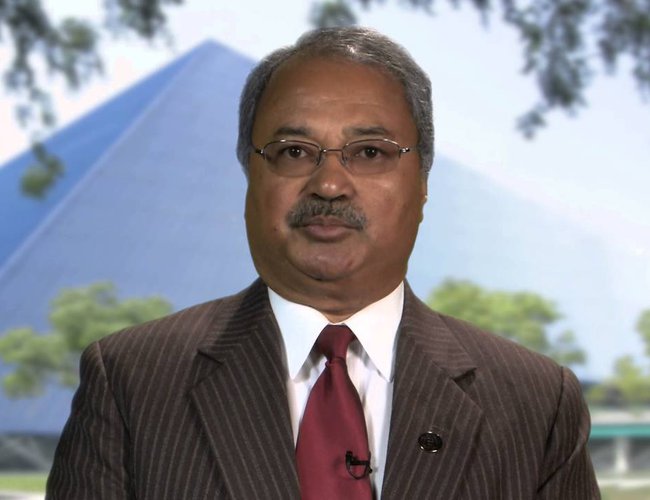
Who or what has been your greatest inspiration?
My parents and elder brothers taught me the difference between right and wrong and instilled the value of education in my mind early on in my life. I knew that a good education was the golden ticket to a bright and secure future personally but also to have a meaningful life. So, my inspiration came especially, from my father and family. Later on, my children were also a great source of inspiration for me as I saw them grow up to be responsible individuals and good contributors to the society.
The work I do and the people I work with around the world are also quite inspiring. I learn every day from the differing points of view I hear and the diverse set of people from all cultural backgrounds and nationalities that I work with. I strongly believe that our world is better and interesting because of the diversity of cultures, languages, opinions and people. Life will really be quite boring and dull if we all had the same likings, opinions and did the same things.
Would you please describe your responsibilities that you now have in the University?
I have a dual role and title in my university as Associate Vice President and Dean. As Associate Vice President, I am the Chief International Officer of my university. In this role, internationalizing my university and creating global learning opportunities for our students is a key part of my responsibility. CSULB has over 60 university partnerships around the world and I work with these universities to develop programs for our students, faculty and staff. We send over 1,100 of our students every year to different parts of the world for study-abroad. We also host almost 3,000 international students in my university from 100 different countries including Nepal. I oversee and manage staff and service units to support our international student body and programs globally.
As a College Dean, I oversee graduate and undergraduate degree programs that are geared towards adults and working professionals. My College also offers Certificate and professional education programs that teach job oriented practical, technical skills to people who are not interested in earning a degree. As a result, I work with many industry and businesses to meet their employees’ training needs.
What is the most rewarding part of your job?
As a teacher-administrator, being able to help our students realize their educational goals is the most rewarding part of my job. As an example, when I meet our students who return from study-abroad program and tell me that the opportunity opened their views of the world and that it transformed their life, I feel overjoyed and feel lucky that I played a small part in their wonderful experience. I also meet many prospective students from many countries wanting to come to CSULB for their further study. When I meet the same student on campus and learn that I was able to help them in their life-journey makes me realize I do an important and meaningful job.
Of course, I am lucky that I work with so many wonderful people in my university as well as my colleagues around the world. The work of an international educator is extremely important as the world gets more interconnected and more interdependent. No one nation or a group of people can solve major global issue by themselves. It requires collective efforts. Having better understanding between people from around the world is key to that collective effort. So, I feel that what I do as an international educator is more than just doing a job. International education programs help foster better understanding among different cultures and people and I feel good that I play a small part in it.
What are the main challenges in your position as Associate Vice President and Dean?
Although Cal State Long Beach is a public university, the state government funding for our university is not sufficient to meet our needs. So, funding and resources are always a challenge. Additionally, many of my programs run with no state funding and therefore we need to generate enough revenue to cover all costs. It is not an easy task as the head of the division, but I enjoy the challenges.
I oversee about 150 staff and faculty in my college. Having to manage a large operation is very complex. Being a manager requires all kinds of skill sets. Getting cooperation from all stakeholders can be challenging and at times daunting. But I know it is part of the job. I get paid to solve those complexities.
My university, Cal State Long Beach is quite large with 38,000 students and over 5,000 faculty and staff. California State University is also the largest university system in the United States with 23 universities and nearly half a million students. So, I work in a bureaucracy which creates challenges. There are times that I feel it would be great if I could just do my job, but it is not that simple.
Working with external constituents and global partners requires knowledge and understanding of different viewpoints, cultures and values. At times, what seems straight forward can be more complicated in a different cultural context. To be an effective leader one needs to have a clear vision, excellent management and leadership skills and being able to tend to multiple issues at the same time. These are challenges I face regularly.
What motivates you in your career?
I tend to see that every challenge presents an opening for new opportunities which gets me going all the time. I get to be innovative, I get to be entrepreneurial and I get to meet and work with people from around the world. As an educator, I also believe that I am making a difference in our students’ lives. That keeps me motivated more than anything. I also enjoy what I do. Without the enjoyment, it will be hard to be motivated.
What should be the main function of a university?
Teaching, research and service are the three major pillars of a university. But at the end of the day, every university’s main job is to help its students succeed – personally, academically and professionally. Everything we do in the university is about our students – helping them to be critical thinkers, and to be productive member of the society. As educators, our job is to make sure that we have provided every opportunity to our students to acquire knowledge and skills so that they can lead a meaningful, productive life.
Universities are also places for inquiry, a place to create new knowledge through research, a place for innovation. Through teaching, research and service, universities should serve its people, community, the country and the world.
What are some of the things your University is doing to internationalize the university?
Our focus is on our students. We are creating opportunities for our students to study-abroad. We have established scholarships so that they can travel and study at different place and gain the world view. Our goal is to double our study-abroad participants in the next few years.
Also, as I mentioned earlier, we have students from 100 different countries who adds tremendous global diversity at our university. We also have many foreign-born professors who are well connected with many international organizations and universities. Students, faculty and staff organize many cultural events on campus throughout the year that brings the world to our university.
We have also initiated a program called, Professors around the World – through which we fund our faculty members to travel and create learning opportunities for our students. Through this program, our faculties members have developed new programs and helped create global partnerships.
What is your view on Nepalese education system and the changes which have taken place in the education sector over the years?
Nepal has gone through many reforms in the last few decades in its education system and certainly made some progress, especially increasing the country’s literacy rates. Although there is some gap between male and female literacy rates, the overall improvement is noteworthy.
However, the overall education system still seems to be a work in progress in all sectors from primary to secondary to higher education. The quality of education in the public or the government run schools and universities continues to be of great concern. They seem to have not improved if not deteriorated. Also, the qualities of education in many private schools that are overtly profit oriented are questionable. There seems to be a gross neglect on regulations and lack of accountability. There are enough policy regulations but having policies alone do not solve problems or address to the issues. Effective implementation and management of those policies are much more important.
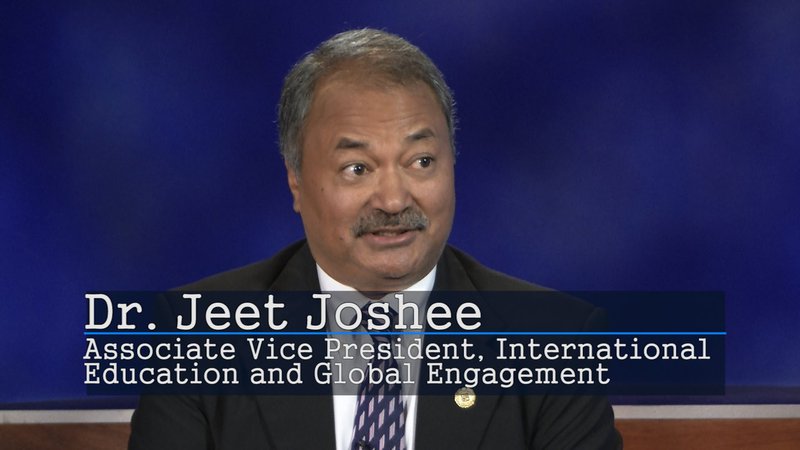 Qualifications of teachers in all sectors and consequently the quality of education are a paramount issue. While the education plan seems to address the need to train more teachers, the actual implementation of that plan does not seem to be carried out. Lack of funding in rural areas hurts those schools more than the ones in the urban areas. I have heard that teachers don’t get paid for months in many schools which I am sure affects negatively how the schools are run. Education must be the top priority for Nepal’s government in order to develop the nation, but it continues to suffer because of bad management, lack of planning and proper implementation.
Qualifications of teachers in all sectors and consequently the quality of education are a paramount issue. While the education plan seems to address the need to train more teachers, the actual implementation of that plan does not seem to be carried out. Lack of funding in rural areas hurts those schools more than the ones in the urban areas. I have heard that teachers don’t get paid for months in many schools which I am sure affects negatively how the schools are run. Education must be the top priority for Nepal’s government in order to develop the nation, but it continues to suffer because of bad management, lack of planning and proper implementation.
We have gone through many political changes in Nepal. In your view how has it affected the Nepali education system?
Instability in the government, when the administration changes every six months, or every year is not a good thing for any country. Nepal seems to have been going through that cycle for quite some time now. How can one plan or see through what is planned when the tenure of the Education Minister keeps changing. Every time there is a new government, there is a new Education Minister who wants to do things differently, wants to bring new people. Before anything is put in place, there might be a new Minister due to the instability in the government. So, this is a destructive cycle. I am sure this situation is creating a state of uncertainty and a do-nothing environment.
Political instability hurts even more in Nepal’s context due to the weak public schools and university system. The educational institutions it seems are dependent of the political system and cannot function by themselves. I also think that the government certainly needs to legislate, make policies and ensure they are properly implemented, but the task of educating and management of educational institutions should be left to qualified educators, teachers and staff. There is too much political intervention in schools and universities as if the political parties and their leaders themselves are running the schools and universities. Political influence in educational institutions is a very unhealthy environment for the education sector in Nepal.
What is your view on the explosive growth of private educational institutions in Nepal? How do they affect the education system?
Private schools and universities play an important role in Nepal’s education system as they are increasingly serving a large group of Nepali students. To an extent, private schools are actually partially fulfilling the government’s education goals and people’s need by educating many students without taking any government funding. So, if done right, to an extent, private institutions, especially the ones that maintain high quality standards could be a good thing for Nepal. But private institutions alone will not solve the myriad of issues facing the education system in Nepal.
Having said that, it also depends on what kind of private institution we are talking about. There are good ones and there are bad ones. There is a wide held perception among parents that private schools provide better quality education than the public schools. This is not necessarily true of all private institutions. There are many private schools in Nepal which is operating solely for profit-making purposes rather than providing good education. So, there needs to be a strong regulatory measure taken by the government to oversee these private institutions. On one hand, almost all private schools are far more expensive than the public schools, and on the other, if they are operating only to make money and not provide good education, this will hurt people and the country. The excessive tuition and fees charged by the private institutions is also an issue from an accessibility perspective. Because only those with money who can pay will have access to private schools. And we all know majority of people in Nepal do not have the income level needed to pay for the expensive private education. So, the growth of private sector education in Nepal can be viewed with both lenses – good and bad.
People think that there is huge gap in the quality of education between public and private institutions? If you think there is this huge gap, what are some of the suggestions you provide to narrow that gap?
As I said in the previous question, there is this perception that private schools provide better quality of education. And it is true that many private schools seem to provide much better quality as it is indicative in the results of the national examinations. Students in private schools seem to be better prepared as the national exam is one indicator of quality. But when you set the bar too low in the comparison, as it seems to be the case for overall public schools, the claim of better quality in the private schools does not provide a true picture. Also, the claim of quality is not true of all private schools. There are also variations among public, government run schools. Some are better than others. Nonetheless, there is a gap if you consider the overall picture.
I think whether it is private or public sector, issues such as teacher training, better school infrastructure, sufficient funding and a major focus on student learning should be addressed to improve the quality of education. Issues in public education system including the issue of quality must be addressed by the government as the public sector serves an overwhelming majority of population.
Recently nationalism has been a widely-discussed topic in Nepal. What are your views on this as someone who was born and raised in Nepal?
It is not only in Nepal; the wave of nationalism is going around the world lately. Nationalism in-itself is not a bad thing – if it can unite people and bring a sense of pride about your country and your identity. But if the nationalism slogan is used to divide people, spread separatism, denigrate unity, it could be a very bad thing for any society and country. I have followed to some extent, the Terai, Madhes, Pahad and so forth movements in Nepal. To me those movements are regionalism or separatism than nationalism. They also seem to be highly politically motivated movements. These types of so called nationalism movements divide people than unite, bring chaos instead of peace and harmony. So, I don’t think movements like that in Nepal help anyone including the leaders of those movements.
Talking about the nationalism, I also want to stress the fact that we all are increasingly living in an interconnected and interdependent world. So, I would like to see more globalism than nationalism. We cannot live in isolation as some of the nationalism movements I have observed tend to advocate for such ideas. In my view those isolationist movements are destructive.
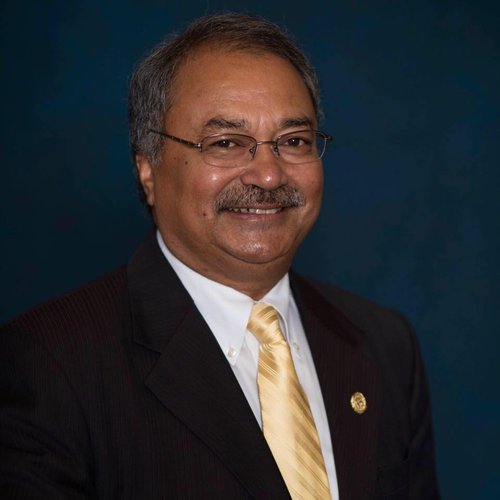 What do you do to stay true to your Nepali roots?
What do you do to stay true to your Nepali roots?
I am not sure if I can fully claim that I have stayed true to my Nepali roots when I have been away for so long. But I care deeply and stay connected to what is happening in Nepal. I also stay engaged with many Nepali organizations in the United States. I volunteer and contribute in activities related to Nepal. When the earthquake hit in 2015, one of the organization I am active in, the Friends of Nepal Los Angeles raised almost $25,000. I know it was a small amount in the scheme of things and the magnitude of devastation in Nepal, but we helped the Nepal Red Cross, brought food and blankets to villages and helped rebuild a children’s learning center and the high school in my home town Bandipur. I do these things when I can to not forget where my roots were and where I began my life’s journey.
I admit that it is not easy to stay connected with Nepal constantly. I have lived in the United States longer than I have in Nepal. So, my personal friends, my professional network and life are in the United States. I try my best, do what I can. For example, my kids largely grew up here but that did not stop me in trying to instill some Nepali values in them while they were growing up. I told them to never forget that they came from Nepal. I told them even if you forget, people will still ask – where are you from. And they have to say – from Nepal. I am an American citizen, but I am also a Nepali-American.

